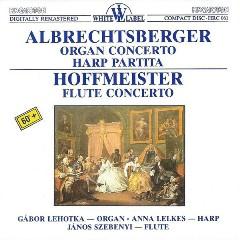Albrechtsberger – Organ Concerto & Harp Partita; Hoffmeister - Flute Concerto (1987)
Albrechtsberger – Organ Concerto & Harp Partita; Hoffmeister - Flute Concerto (1987)

Albrechtsberger - Concerto For Organ And Strings In B Flat Major 1 I. Allegro Moderato 6:56 2 II. Adagio 12:36 3 III. Finale: Allegro 7:40 Hoffmeister - Concerto For Flute And Orchestra In D Major 4 I. Allegro Brillante 11:32 5 II. Adagio 6:21 6 III. Rondo (Allegretto) 4:46 Albrechtsberger - Partita For Harp And Orchestra In F Major 7 I. Presto 4:06 8 II. Adagio Un Poco 8:25 9 III. Menuet 2:58 10 IV. Finale: Allegro 3:53 Gábor Lehotka – organ János Szebenyi – flute Anna Lelkes - harp Budapest Philharmonic Chamber Orchestra Frigyes Sándor - conductor
Johann Georg Albrechtsberger gave lessons to Beethoven and succeeded Mozart, at the latter’s request, as assistant to the Kapellmeister of St Stephen’s Cathedral in Vienna, with right of succession, a promotion realised two years after Mozart’s death, in 1793. He won contemporary distinction as an organist, composer and teacher, and displayed a particular mastery of counterpoint, reflected in his own 240 fugues and in the later work of his pupil Beethoven.
Albrechtsberger published an enormous quantity of fugues and preludes and fugues, many for either organ or harpsichord. He left some 278 keyboard works, which, in general, show his technical skill.
Equally prolific in chamber music for various groups of instruments, Albrechtsberger based many of his instrumental compositions on the church sonata of the Baroque period, with its contrapuntal content.
While Albrechtberger’s four symphonies may be forgotten, his concertos for jew’s harp have occasionally made their way into the modern trumpet repertoire. He also wrote concertos for trombone, for harp and for organ. ---naxos.com
Franz Anton Hoffmeister was a music publisher and a very prolific composer. A potential for confusion arises from the fact that in his time there was another publisher named Friedrich Hofmeister, and that this younger man for a time worked for Hoffmeister.
Hoffmeister studied law in Vienna. He did well enough at law school to pass his examinations and qualify to practice, however, he chose a career in music. He decided to self-publish his works. On January 24, 1784, he ran an advertisement in the Wiener Zeitung announcing a series of his own works, plus compositions by Haydn, Mozart, Vanhal, and several others. The firm was successful enough for several years, though there were times when Hoffmeister neglected it to do his own composing. This started a period of decline for the firm, and Hoffmeister sold off some of his catalog to the established firm of Artaria. There are examples of works that were still in production with Hoffmeister when sold to Artaria, where the identity of the music's engraver (and hence the visual appearance of the music) changes suddenly in mid-composition. Productivity of the firm continued to decline. With the year 1800 approaching and the business faltering, Hoffmeister started to plan a major concert tour. This put him in contact with Ambrosius Kühnel of Leipzig. The two ended up founding a new firm, the Bureau de Musique. Over the next four years the Hoffmeister firm gradually folded into its new main office in Leipzig as he withdrew from business to compose full time. Finally, Hoffmeister settled all the publishing rights on Kühnel for a lifetime annuity. While Hoffmeister had lacked direction as a business manager, his instincts in publishing and cultivating composers were outstanding. Albrechtsberger, Mozart, Clementi, Haydn, and Beethoven were all represented in his catalog. The firm he and Kühnel founded eventually became the C.F. Peters company, which remained one of the world leaders in music publishing two centuries later.
Hoffmeister continued to do some editorial work, including major series of issues of music by Bach, Haydn, and Mozart. Hoffmeister wrote over 70 symphonies, string quartets (including some that for a while were thought to have been written by Haydn), dozens of other chamber pieces, some attractive teaching pieces, and some operas, one of which was produced in at least six cities. His music is pleasant and distinguished by nicely flowing melodic lines, although it lacks originality. A revival of his music in the late twentieth century was particularly sparked by flute players who admire his 12 flute quintets (with violin, two violas, and cello) and other flute music. --- Joseph Stevenson, allmusic.com
download (mp3 @320 kbs):
yandex 4shared mega mediafire uloz.to cloudmailru uptobox ge.tt








